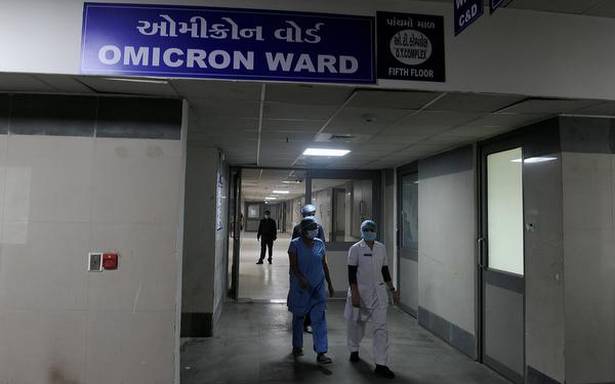Hong Kong research says it infects, multiplies faster than Delta in bronchus
The Omicron variant of SARS-CoV-2 infects and multiplies faster than the Delta variant and original SARS-CoV-2 in the human bronchus, which may explain why it may transmit faster between people than previous variants. However, it does not easily infect the lower lungs and this, researchers say, potentially explains why instances of severe disease are proportionally lower in cases involving Omicron.
The study was led by researchers from the LKS Faculty of Medicine at the University of Hong Kong.
Also read | Extreme caution, warns Kolkata doctor as Bengal records 1st Omicron case
The two bronchi lie at the end of windpipe and split like a ‘y’ into each lung. The research paper, that is still being peer reviewed, however, does not explain why the virus was less successful in progressing deeper into the lungs compared to previous variants.
The scientists used lung tissue removed for treatment of the lung, which is normally discarded, for investigating viral diseases of the respiratory tract. After isolating the Omicron SARS-CoV-2 variant, they used it to compare infection with the original SARS-CoV-2 from 2020, the Delta variant and the Omicron variant. They found that Omicron replicated around 70 times higher than the Delta variant and the original SARS-CoV-2 virus over 24 hours. In contrast, the Omicron variant replicated less efficiently (more than 10 times lower) in the lung tissue than the original SARS-CoV-2 virus.
Note of caution
However scientists involved with the study said this was not reason enough to breathe easy. “It is important to note that the severity of disease is not determined only by virus replication but also by the host immune response, which may lead to dysregulation of the innate immune system, or cytokine storm,” said Dr. Michael Chan Chi-wai, Associate Professor, School of Public Health, HKUMed and the leader of the study, in a press statement.
Also read | Four more cases of Omicron detected in Delhi
“By infecting many more people, a very infectious virus may cause more severe disease and death even though the virus itself may be less pathogenic. Therefore, taken together with our recent studies showing that the Omicron variant can partially escape immunity from vaccines and past infection, the overall threat from Omicron variant is likely to be very significant.”
India has so far reported at least 73 cases of the Omicron variant and reports from a study in South Africa, which has seen the fastest rise of the Omicron surge, suggest that at least a fourth of nearly 78,000 positive cases were of the Omicron variant. Recent laboratory studies so far also suggest that antibodies produced against Omicron by those vaccinated were 20-40 times fewer than in older variants. The antibody levels were highest in those vaccinated and with previous exposure to the virus.
Also read | No death due to lack of oxygen during COVID-19 second wave: U.P. Govt
The United Kingdom has reported around 10,000 cases of Omicron so far with at least 10 people hospitalised. One person has died after contracting the variant, which is anticipated to become the dominant strain. The country is currently reporting close to 80,000 cases a day. India has seen daily case counts dip to 5,000 a day but has now seen an increase to around 7,000 on Thursday with nearly 3,500 cases being reported out of Kerala. Most of these reportedly involve the Delta and its related variants.
Anurag Agrawal, Director, CSIR-IGIB and closely involved with the sequencing of SARS-CoV2 variants, tweeted that the findings were an “interesting twist” and could mean less severe infections. “Omicron infects and replicates better in airways than lung compared to ancestral SARS CoV2 / Delta. This could translate to less severity — more like a Upper Respiratory Infection / common cold than a pneumonia, but I still think of the threat level as high.”
Source: Read Full Article

